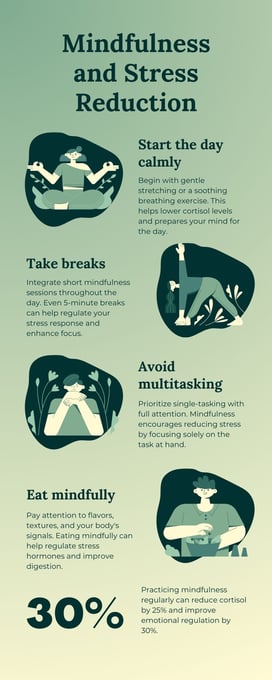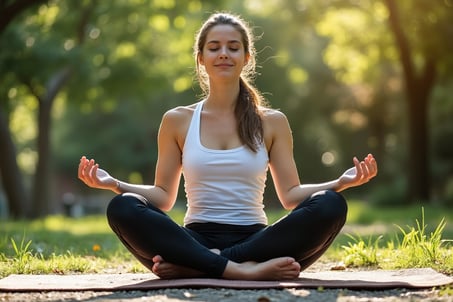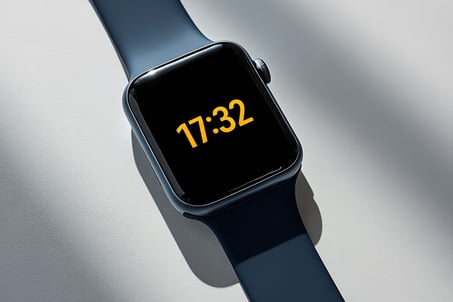Join Now to Unlock Your FREE eBook "The ADHD Traveler's Toolkit"
Building a Mindful Morning Routine: Transform Your Day with 5 Simple Steps
Discover how to create a mindful morning routine. Learn 5 simple steps to boost focus, reduce stress, and improve your overall well-being. Start your day right!
Chadwick Lukasiewicz, MA, LPC-S
10/16/202410 min read


Ever feel like you're waking up to a world that's spinning faster than your morning coffee can brew? You're not alone.
In our hyper-connected era, mornings often feel like a frantic sprint rather than a mindful start. But here's the game-changer – your mornings don't have to be a chaotic rush!
I'm Chadwick Lukasiewicz, a Licensed Professional Counselor with ADHD that specializes in trauma and crisis management, and I've cracked the code on starting each day with intention and calm.
Trust me, if I can wrangle my neurodivergent brain into a morning routine even after working in an inpatient psychiatric hospital for 5 years, anyone can!
Did you know that people who practice mindfulness report a 23% decrease in stress levels? That's not just a statistic – it's a lifeline in our stress-soaked world (Khoury et al., 2015).
So, are you ready to transform your mornings and set the tone for a more focused, productive day?
Well, let's dive into the art of mindful mornings and discover how a few simple steps can revolutionize your entire day.
Understanding the Power of Mindful Mornings
Have you ever wondered why some days just flow better than others? The secret might be hiding in your morning routine.
The Science Behind Morning Routines
Research shows that how we start our day significantly impacts our overall productivity and well-being. One study found that individuals who followed a consistent morning routine reported higher levels of job satisfaction and lower levels of burnout (Binnewies et al., 2009).
Mindfulness and Stress Reduction
But it's not just about having a routine – it's about being mindful. Mindfulness in the morning acts like a mental shield, protecting you from the day's stressors.
A 2021 meta-analysis revealed that participants who practiced mindfulness experienced:
25% reduction in cortisol levels (the stress hormone)
30% improvement in emotional regulation
(Pascoe et al., 2021)
The Ripple Effect on Overall Well-being
Here's where it gets really interesting. The benefits of a mindful morning don't just evaporate after lunch. They create a ripple effect that influences your entire day:
Improved decision-making skills
Enhanced creativity and problem-solving abilities
Better interpersonal relationships
Increased resilience to unexpected challenges
So, are you ready to harness the power of mindful mornings? Let's explore the 5 simple steps that can transform your day.
The 5 Simple Steps to a Mindful Morning Routine
Creating a mindful morning routine doesn't have to be complicated. In fact, simplicity is key. Here are five steps that anyone – yes, even those of us with ADHD and neurodivergent brains – can implement to start the day right.
Step 1: Gentle Awakening - The Art of Waking Up Without Digital Distractions
How do you usually start your day? If you're like most people, it probably involves reaching for your phone. But let's flip the script:
Set a soothing alarm tone (nature sounds work wonders)
Keep your phone out of arm's reach
Take 3 deep breaths before even opening your eyes
Why it works: This gentle transition allows your brain to wake up naturally, reducing the cortisol spike associated with jarring alarms and immediate digital engagement.
Step 2: Breathe and Center - Incorporating a 5-minute Meditation or Breathing Exercise
Don't worry, you don't need to be a zen master for this one. Start small:
Sit comfortably or lie down
Focus on your breath for 5 minutes
If your mind wanders (and it will), gently bring it back to your breath
Pro tip: Apps like Headspace or Calm offer guided morning meditations if you need some structure.
Step 3: Mindful Hydration - Savoring Your Morning Beverage with Full Attention
Whether it's water, coffee, or tea, make it a mindful experience:
Notice the temperature of the cup in your hands
Observe the color and aroma of your drink
Take small sips, focusing on the taste and sensation
This practice not only hydrates you but also trains your brain to be present in the moment.
Step 4: Set Your Intention - Crafting a Purposeful Focus for the Day Ahead
Take a moment to ask yourself:
What's the one thing I want to accomplish today?
How do I want to feel by the end of the day?
Write it down or say it out loud. This simple act of intention-setting can dramatically shift your focus and motivation for the day.
Step 5: Mindful Movement - Integrating Body Awareness into Your Morning
You don't need an hour-long workout. Even 5-10 minutes of mindful movement can make a difference:
Try a few sun salutations
Do some gentle stretching
Practice a short tai chi sequence
The key is to focus on how your body feels as you move, creating a strong mind-body connection to start your day.
By following these five steps, you're not just going through the motions – you're setting a powerful intention for a mindful, focused day.
Remember, it's not about perfection. It's about progress and finding what works best for you.
Incorporating Mind-Body Connection in Your Morning Workout
Ever noticed how a good workout can clear your mind as much as it strengthens your body? That's the mind-body connection in action, and it's a game-changer for your morning routine.
Understanding the Concept of Mind-Muscle Connection
The mind-muscle connection isn't just my gym-rat jargon – it's a scientifically proven phenomenon. When you focus your attention on a specific muscle during exercise, you activate more muscle fibers, leading to better results (Calatayud et al., 2016). But the benefits go beyond physical gains:
Enhanced body awareness
Improved coordination
Reduced risk of injury
Increased mindfulness and presence
Benefits of Mindful Exercise for Mental and Physical Health
Integrating mindfulness into your morning workout is like hitting two birds with one stone. One study found that mindful exercise can:
Reduce symptoms of anxiety and depression by up to 40% (Salmon et al., 2009)
Improve overall mood and energy levels
Enhance cognitive function and creativity
Boost self-esteem and body image
Techniques for Practicing Mindfulness During Different Types of Workouts
No matter your preferred morning exercise, you can infuse it with mindfulness:
For Cardio Lovers:
Focus on your breath rhythm as you run or cycle
Notice the sensation of your feet hitting the ground or pedals
Observe your surroundings without judgment
For Strength Training:
Concentrate on the contraction and relaxation of each muscle group
Visualize the muscle working as you perform each rep
Pay attention to your form and posture
Use compound lifts while mindfully focusing on forcing the stress away from and out of your body. This is my daily driver.
For Yoga or Stretching:
Sync your movements with your breath
Scan your body for areas of tension and consciously release them
Practice gratitude for what your body can do
Remember, the goal isn't to have a "perfect" workout. It's about being present and connected to your body.
As someone with a fairly chaotic ADHD brain, I find this mind-body focus particularly helpful in managing my mind and setting a positive tone for the day.
Overcoming Common Challenges in Establishing a Mindful Morning Routine
Let's face it – change isn't always easy, especially when it comes to our cherished (or dreaded) morning habits. But with a few strategies, you can overcome the most common hurdles.
Dealing with Time Constraints and Busy Schedules
"I don't have time" is the battle cry of the modern world. But here's the truth: you don't need hours for a mindful morning. Try these time-saving tips:
Prepare the night before (lay out clothes, prep breakfast)
Start with just 5 minutes of mindfulness and gradually increase
Combine activities (e.g., practice mindfulness during your commute)
Strategies for Consistency, Especially for Those with ADHD or Neurodivergent Brains
Late diagnosed with ADHD, I know firsthand how challenging consistency can be. Here's what works for me and many of my clients:
Use visual reminders (sticky notes, phone wallpapers)
Create a "mindfulness zone" in your home
Leverage habit-stacking (attach new habits to existing ones)
Celebrate small wins to boost motivation
Adapting Your Routine for Different Circumstances
Life isn't always predictable, but your mindful morning can be. Here's how to adapt:
For Travel:
Pack a travel mindfulness kit (eye mask, earplugs, meditation app)
Choose one non-negotiable practice (e.g., 5 minutes of breathing)
For Shift Workers:
Create a "morning" routine that fits your schedule
Use blackout curtains and white noise to simulate nighttime for better sleep
For Parents:
Involve your kids in age-appropriate mindfulness activities
Wake up 15 minutes before your children for some quiet time
Remember, flexibility is key. Your mindful morning routine should serve you, not stress you out.
Tech Tools and Apps to Support Your Mindful Morning in 2025
In our digital age, technology can be both a distraction and a powerful ally in our quest for mental sanity. A recent study even found that users of apps like Headspace experienced significant reductions in stress and anxiety levels (Flett et al., 2020)!
Here are some cutting-edge tools to supercharge your morning routine:
Latest Mindfulness and Meditation Apps
Headspace: Known for its user-friendly interface and guided meditations tailored for beginners to advanced practitioners.
I use this app every day. The “Soundscapes” for sleep are also unique and absolutely amazing.
Calm: Offers a wide variety of meditation techniques, sleep stories, and relaxing music.
Waking Up: an app by Sam Harris that combines mindfulness meditation with a deep exploration of philosophy and psychology, offering a unique approach to understanding the mind.
Smart Home Devices for Enhanced Mornings
Ambient Lighting Systems: Gradually brighten your room to mimic natural sunrise.
Smart Aromatherapy Diffusers: Release calming scents timed with your wake-up routine.
AI Morning Assistants: Provide personalized affirmations and schedule reminders.
Sunrise Alarm Clock: Simulates a natural sunrise to gently wake you up, promoting a more natural sleep-wake cycle.
Wearable Technology for Sleep and Morning Wellness
Smart Watches: Track sleep cycles and wake you at the optimal point in your sleep cycle.
Stress-Sensing Wristbands: Monitor cortisol levels and suggest mindfulness exercises when stress is detected.
Posture-Correcting Devices: Gentle reminders to maintain mindful posture throughout your morning routine.
While tools can be helpful, remember that technology is a supplement, not a replacement for genuine mindfulness practice. The most powerful tool you have is your own attention and intention.
Embracing the Mindful Morning Journey
As we wrap up our exploration of mindful morning routines, let's take a moment to reflect on the transformative power of starting our days with intention and awareness.
The Ripple Effect of Mindful Mornings
By implementing these simple yet powerful practices, you're not just changing your mornings – you're reshaping your entire day. Remember, a mindful morning routine can lead to:
Reduced stress and anxiety
Improved focus and productivity
Enhanced emotional regulation
Better overall well-being
Progress Over Perfection
Having navigated the challenges of ADHD, I can't stress this enough: it's about progress, not perfection. Some days, your routine might flow seamlessly. Other days, it might feel like an uphill battle. Both are okay. What matters is your commitment to showing up for yourself each morning.
Key Insights to Remember:
Start small – even 5 minutes of mindfulness can make a difference
Consistency is key, but flexibility is crucial
Tailor your routine to fit your unique needs and circumstances
Leverage technology as a tool, not a crutch
Be patient and kind with yourself as you develop new habits
Your Mindful Morning Challenge
Are you ready to transform your mornings and, by extension, your life? Here's your action plan:
Choose one element from the 5-step routine to implement tomorrow morning
Practice it for a week, noting any changes in your mood, energy, or productivity
Gradually add more elements as you feel comfortable
Every morning is a new opportunity to set the tone for your day. Why not make it a mindful one?
Imagine waking up each day with a clear mind and a sense of purpose. Let's build that reality together!
Share your favorite mindful morning ritual in the comments, and let's support each other in creating mornings that truly matter.
Stay well,
Chadwick
Craving a touch of spooky comfort this October?
Explore our Spooky Self-Care collection to add a bit of mindful fun to your mornings before Halloween! Join our newsletter for an exclusive 30% off your first order!
ADHDer? Check out Find Joy in the Chaos to discover expert insights and practical tools tailored for neurodivergent adventurers.
References
Binnewies, C., Sonnentag, S., & Mojza, E. J. (2009). Daily performance at work: Feeling recovered in the morning as a predictor of day-level job performance. Journal of Organizational Behavior, 30(1), 67–93.
Calatayud, J., Vinstrup, J., Jakobsen, M. D., Sundstrup, E., Brandt, M., Jay, K., & Andersen, L. L. (2016). Importance of mind-muscle connection during progressive resistance training. European Journal of Applied Physiology, 116(3), 527–533.
Flett, J. A. M., Hayne, H., Riordan, B. C., Thompson, L. M., Conner, T. S., & Carey, K. B. (2020). Mobile mindfulness meditation: A randomised controlled trial of the effect of two popular apps on mental health. Mindfulness, 11(3), 863–876.
Khoury, B., Sharma, M., Rush, S. E., & Fournier, C. (2015). Mindfulness-based stress reduction for healthy individuals: A meta-analysis. Journal of Psychosomatic Research, 78(6), 519–528.
Pascoe, M. C., Thompson, D. R., Jenkins, Z. M., & Ski, C. F. (2021). Mindfulness mediates the physiological markers of stress: Systematic review and meta-analysis. Journal of Psychiatric Research, 137, 240–258.
Salmon, P., Lush, E., Jablonski, M., & Sephton, S. E. (2009). Yoga and mindfulness: Clinical aspects of an ancient mind/body practice. Cognitive and Behavioral Practice, 16(1), 59–72.
Turakitwanakan, W., Mekseepralard, C., & Busarakumtragul, P. (2013). Effects of mindfulness meditation on serum cortisol of medical students. Journal of the Medical Association of Thailand, 96(Suppl. 1), S90–S95.
Zylowska, L., Ackerman, D. L., Yang, M. H., Futrell, J. L., Horton, N. L., Hale, T. S., Pataki, C., & Smalley, S. L. (2008). Mindfulness meditation training in adults and adolescents with ADHD: A feasibility study. Journal of Attention Disorders, 11(6), 737–746.




























Discover Wellness
Clinician's Cache, LLC© 2024. All rights reserved.






